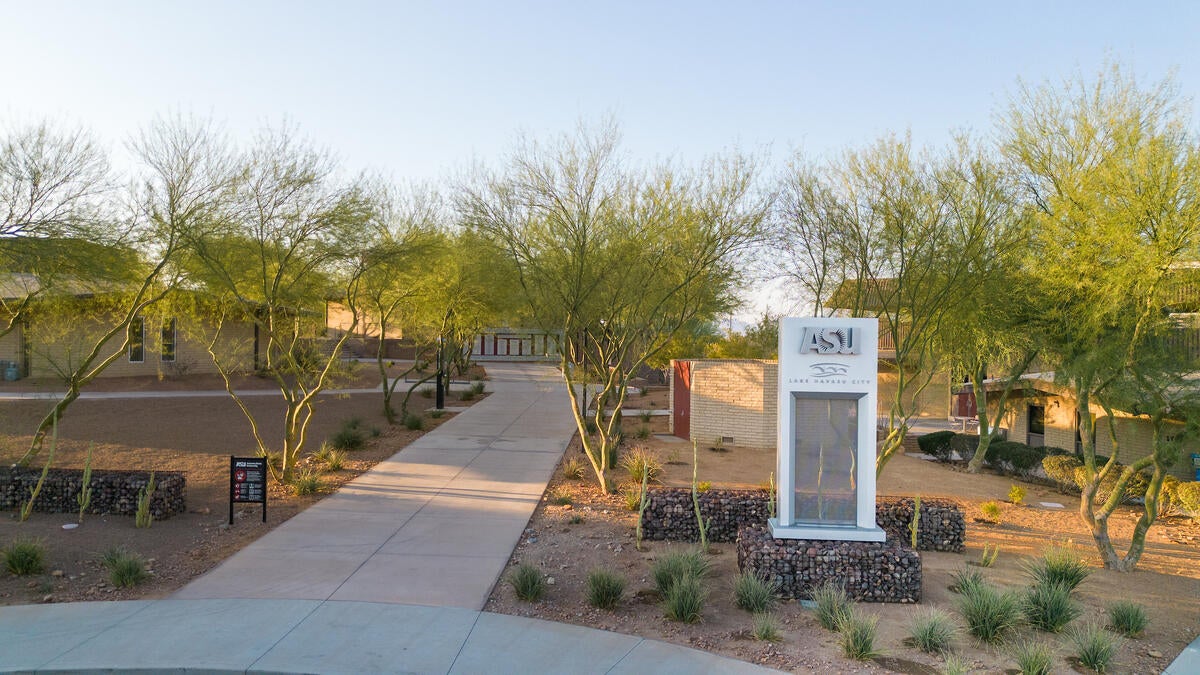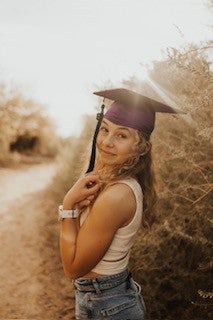Editor's note: ASU News is highlighting some of its notable incoming students for fall 2023.
Katie Bell is wasting no time in reaching for her goals.
The 16-year-old, who graduated early from Lake Havasu High School, is a first-year Arizona State University student at ASU Local – Lake Havasu.
ASU Local is an innovative hybrid college program that pairs in-person coaching and mentorship with the flexibility of accessing all coursework online, 24/7, through ASU Online.
Katie Bell graduated from high school early and is starting at ASU Local – Lake Havasu as a 16-year-old.
The hybrid undergraduate program also is available in Los Angeles; Long Beach, California; Washington, D.C.; and Yuma, Arizona.
Taking online classes is nothing new for Bell, who was able to get her diploma early because she earned credits from an online high school starting in eighth grade.
“My parents and I discussed, ‘What if I started taking summer classes to get ahead and get credits?’” she said.
“I took all my junior classes my sophomore year, and I decided to graduate early because I had all the credits.”
Bell, who will live at home this semester, is looking forward to being on a college campus but still taking online classes.
“I can get tutored if I need to, and I can bring my classes with me anywhere,” she said.
Bell answered some questions from ASU News.
Question: Why did you choose ASU Local – Lake Havasu?
Answer: I chose ASU Local – Lake Havasu to save a little bit of money but also because it brings me so many opportunities, so it’s a good choice for me.
Q: What is your major and why did you choose that major?
A: My major is preveterinary medicine with (biological) science, and I chose this so I could move on to earning my doctorate in veterinary medicine because I do one day want to be a veterinarian.
Q: What are you most excited to experience during your first semester at ASU?
A: Since it’s my first year, I’m excited to see what college is all about. I wanted to get out of high school to see new things and college will be a fun experience.
Q: What talents and skills are you bringing to the ASU community?
A: I feel like I bring a lot of determination. I’m very motivated and driven to get to what I want and the goals I’ve set. I’ve had a lot of goals set for a while and I’ve been motivated to get them done.
Q: What do you hope to accomplish during your college years?
A: I want to earn my doctorate by the age of 24. I want to get it done as fast as possible so I can start my vet career.
Q: Did you always want to be a veterinarian?
A: My parents always told me that when I was little, I would play with stuffed animals and fix them up, so even then I had this passion for it. In fourth grade was when I decided to be a vet. I’ve always had a passion to help save animals.
I volunteer at our local Humane Society and I have an internship at animal hospital. I shadow their vet tech, so I follow her around and learn about what she does, helping with surgeries and anything she needs. It’s actually very cool.
Top image of ASU at Lake Havasu by Deanna Dent/ASU
More Science and technology

Science meets play: ASU researcher makes developmental science hands-on for families
On a Friday morning at the Edna Vihel Arts Center in Tempe, toddlers dip paint brushes into bright colors, decorating paper fish. Nearby, children chase bubbles and move to music, while…

ASU water polo player defends the goal — and our data
Marie Rudasics is the last line of defense.Six players advance across the pool with a single objective in mind: making sure that yellow hydrogrip ball finds its way into the net. Rudasics, goalkeeper…

Diagnosing data corruption
You are in your doctor’s office for your annual physical and you notice the change. This year, your doctor no longer has your health history in five-inch stack of paperwork fastened together with…



